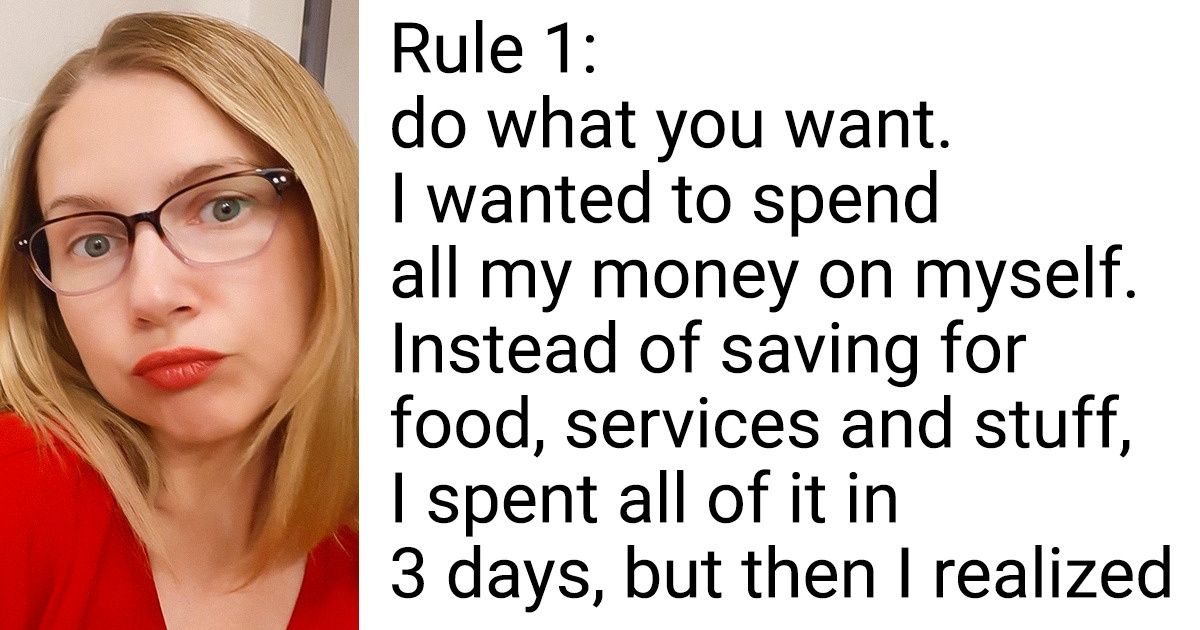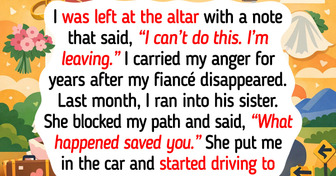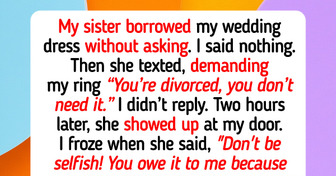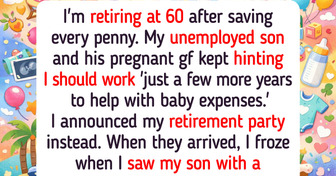That's seriously messed up. Obviously her working environment has been toxic from the start. Look at how they treat her just for standing up for herself. She's better off without them.
I Lived 7 Days Following the Rules of a Famous Psychologist and Stopped to Save My Life

Psychologist Mikhail Labkovskiy, author of the famous book I Want and I Will: Accepting Yourself, Loving Life, and Becoming Happy, is definitely an edgy person: his big statements often make people that are interested in psychology feel a lot of conflicting emotions.
My name is Yulia and I decided to do an experiment that I’m going to tell Bright Side readers about: For a week, I tried to follow the rules formed by this famous psychologist. And even though they are incredibly simple, I had a very hard time following them.
Rule № 1: Do what you want.
For a long time, I’ve wanted to spend my whole income on myself, instead of saving it, or spending it on food, services, and stuff. I spent everything in 3 days, and then I found out that my husband’s paycheck would be delayed for 3 days. It was a terrible moment, and I was extremely nervous. To calm myself down, I put on one of the dresses I bought and used a new super-expensive lipstick. I kept telling myself that I deserved all of this, and that I could just do it once and it would be okay.

Honestly, it wasn’t very effective. My mind kept telling me that I’d made a mistake. How could I have done something so irresponsible — we have kids!
In the following days, I still tried to live by the rule and only do the things I wanted to do. But these were almost impossible to do without any money. I was on my way to work and I wanted to buy a cup of coffee, but then I remembered that we had almost no money. I wanted to buy my daughter a new dress for her birthday, but then I realized that I could only decorate her last one. I felt terrible: It was her birthday and I would be the one wearing a new dress — she wouldn’t.
Conclusion: Yes, doing something for myself felt nice. But harsh reality completely shattered this rule for me. In the real world, you’re not on your own, you have responsibilities and you have to take them into account. Besides, after doing something you want 2-3 times, the satisfaction you get decreases. There weren’t many things I wanted to do. Try and name at least 5 wishes you have that you can afford.
Rule № 2: Don’t do what you don’t want to do.
I have a colleague at work that always makes me mad. So, I finally told her that I wouldn’t do anything beyond my official job requirements. She got really angry and started to spread rumors about me. So before, I’d never had any problems with my other colleagues, but now many of them don’t talk to me and don’t invite me to the cafeteria with them.
At home, things didn’t go well either. Every year, at the beginning of spring, we go out of town for a few days with my husband’s relatives. My husband and kids love it and I don’t, because I have to do a lot of work. This time, I asked my husband to go without me. My husband was upset and stopped talking to me, my children were sad, and my relatives got angry with me. I ended up hiding in the bathroom.

Then they left and I was alone in the apartment. I ordered some sushi and started watching a film that my husband had never wanted to watch with me. I wanted to have fun with my newfound loneliness and silence so I didn’t understand why, for the entire 3 days that they were away, I felt as if I was breaking rules and my parents would find out at any moment.
Conclusion: Refusing to go with my relatives was painful. I’m not going to do this again. But saying “no” to the colleague felt nice since I’ve wanted to do this for a long time. So, I will use this rule with the people that are not very close to me.
Rule № 3: Tell people you don’t like something right away.
My family quickly found out that I hate it that nobody does the dishes, nobody takes out the trash, and nobody helps dust. Obviously, I was suppressing a lot of feelings that were a surprise both for me and for my family.
But I didn’t stop with my family. I would take a walk with my neighbor almost every day: our kids are the same age and we see each other on the playground. Somehow, she thought we were friends and she’d often come to our place and stay until late at night. I’m an introvert and this communication was kinda hard for me. Around this time she came over to our place again and when this happened, I said, “Sorry, because of these long talks, I’ve started to talk to my husband and kids less. Let’s meet outside tomorrow, okay?”

We met the next day and I talked to her, as usual. The relationship got a little tense, but she stopped coming to our place.
Conclusion: In our childhood, we talk honestly about the things we don’t like, but many parents don’t really care. And they make us eat, play, read, and do things we don’t like. So, we grow up becoming okay with doing what we don’t want to do.
I actually thought that if I were direct with people, they would hate that and would stop talking to me. But it turned out that they can live with that. And those that can’t are probably not my people. So, I am getting used to this rule. We have to tell others about things we don’t like.
Rule № 4: Don’t talk unless you’re asked to.
I’ve always hated it that when you tell something to someone close to you, and they shoot you with a lot of pieces of advice that you never asked for.
I know a girl who often talks about her problems and says that she doesn’t know what to do. She does it so much, that you inevitably have to tell her what to do. So, I did just that and then I was angry when I found out that she did exactly the opposite. It lasted for years and it was the same thing over and over again: she’d call me, complain for hours, and I’d react and give her my thoughts. And then I was angry that she didn’t do as I said.

So, it happened again, my friend told me about her new problem. I was already on my way to think about possible solutions, but then I stopped. And I said something along the lines of, “I don’t even know what to tell you.” And then she spent an hour talking about the silly ideas she was offered by 3 other friends and about how she plans to do something very different. I listened to that and realized that, before, I would have been on that list of silly ideas too.
Conclusion: It’s incredibly hard to be able to stop and not talk about the things you aren’t asked about. But deep inside, we know when people want our advice and when they just want to talk. So, I learned to see the difference clearly. And my friend lost interest in me — there was nothing she could talk to me about. And I realized I wasn’t interested in people like her. They just use your emotions and they don’t actually need your advice.
Rule № 5: Answer questions simply.
When I started thinking about this rule and analyzing my behavior, I realized that I would often wander off in my conversation, answering the simplest of questions. Once, my husband asked me if I’d go to the supermarket the next day and I started telling him all about my plans for the day. Then I noticed his bored eyes and stopped.

This was a sobering realization. But then I realized that these short answers are only good for men. Many of my female friends were okay with my chatting. I tried being specific in my answers several times, but this would upset them and they thought I didn’t want to talk to them.
Conclusion: I only use this with men. With women, it’s often pointless — we, unlike men, want to talk more in depth about things.
Rule № 6: When discussing relationship problems, talk about yourself.
I’d known about this rule in theory for a long time. It’s a way to not hurt other people’s feelings, but it’s hard to do in real life, especially in the middle of an argument. It’s easier to say something like, “You are the one that keeps forgetting to pick the kids up from school!” instead of, “I don’t feel like I have a reliable partner.”
Once, my husband and I started arguing about something. As usual, we were talking loudly, but then I remembered that I had a new life now. I stopped yelling and quietly said that I felt lonely and lost when we had fights. My husband was shocked. He got quiet, and then he sat next to me and we talked like we hadn’t talked for ages.
Conclusion: This definitely works. Lately, we’d been having a lot of fights, but now they are on a different level: we don’t yell, we discuss problems. We also try not to blame each other.
When I was starting this experiment, I expected it to be fun, enlightening, and easy. I was wrong: it was really hard. I wanted to change some things about my life and I honestly tried to follow all the rules. But it turned out that you have to be a very strong person to be able to stop what you’re doing and follow them.
Besides, I didn’t always feel morally good: it’s hard to tell people about what I like and what I don’t. Some things made me feel very bad, like for example, my relationship with my coworkers is still bad. Now, I have to find a new job or ask about getting transferred to a different branch.
I guess if I followed all the rules literally, I would lose my family and my job. Or maybe, I was just taking the recommendations too seriously.
Do you know about these famous rules by Mikhail Labkovskiy? Do you think people should really live according to them?
Comments
I'm glad that she decided to stop this experiment :)
I wish all people texted like this
Related Reads
15+ People Who Handled Tasks While at Their Wits’ End

11 Hidden Cartoon Details That Went Unnoticed by Kids but Were Spotted by Their Parents

My Parents Wanted a ‘Family Vacation’ on My Budget—I Made One Move They Didn’t Expect

I Refused to Pay for Our Valentine’s Dinner—Then I Learned the Heartbreaking Truth

11 People Whose Small Acts of Kindness Turned Tears Into Smiles

I Absolutely Refuse to Give Up My Apartment for My Sister and Her 3 Kids

10 Times a Moment of Pure Cruelty Was Actually a Secret Act of Kindness

10 Moments Where Kindness Didn’t Argue—It Acted

I Refused to Talk to My Parents After They Chose My Ex-Wife Over Me

15 Moments That Prove Kindness and Mercy Are Quietly Saving the World

12 Stories That Prove Kindness Is the Strongest Armor

I Refuse to Sacrifice My Retirement to Help My Unemployed Son, I’m Not His ATM
